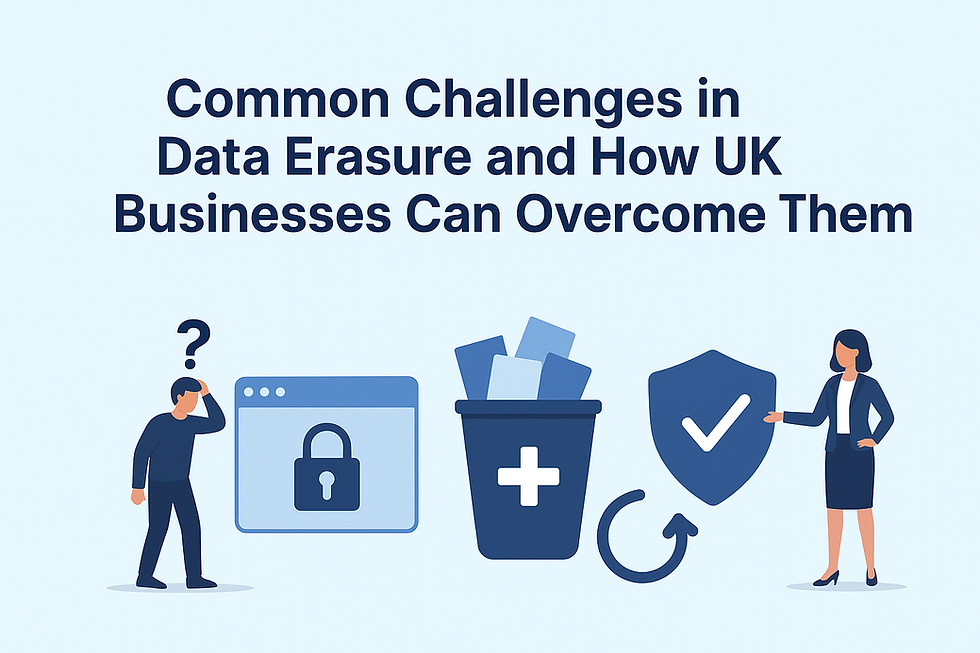Why Data Erasure Services Are Essential for UK Businesses in the Digital Age
- computerwasterecyc
- Oct 29, 2025
- 4 min read

In today’s fast-paced digital age, UK businesses rely heavily on technology to store, process, and manage vast amounts of sensitive information. From customer data and financial records to intellectual property, the digital footprint of companies continues to grow. While this presents incredible opportunities for efficiency and innovation, it also creates significant risks when it comes to managing obsolete or unused IT equipment. This is where professional data erasure services become essential.
In this blog, we’ll explore why UK businesses must prioritise data erasure, how it safeguards their operations, and how trusted providers like Computer Waste London play a key role in helping companies protect their data while responsibly disposing of IT assets.
The Increasing Importance of Data Security in the Digital Era
With cyberattacks and data breaches making headlines regularly, data security is at the forefront of business concerns in the UK. The General Data Protection Regulation (GDPR) and other regulations impose strict rules on how organisations handle personal data, including the safe disposal of outdated devices containing sensitive information.
Simply deleting files or formatting hard drives is not enough to ensure data is unrecoverable. Sophisticated recovery tools can restore supposedly deleted data, putting businesses at risk of costly breaches, legal penalties, and reputational damage. This highlights the critical need for certified data erasure services that guarantee secure and complete removal of data from all types of IT equipment.
What Are Data Erasure Services?
Data erasure services use specialised software and techniques to overwrite existing data with random patterns multiple times, making it impossible to recover. This process is far more secure and environmentally friendly than physical destruction methods, which often involve shredding or crushing devices.
Certified data erasure providers follow international standards such as NIST 800-88 and provide verifiable certificates of erasure, helping businesses demonstrate compliance with data protection laws. These services cover a wide range of devices including laptops, desktops, servers, mobile phones, and storage media.
Complementing Data Erasure with Hard Drive Shredding Services
While data erasure is effective for reusable devices, some organisations choose to combine it with physical destruction methods for an added layer of security. Hard drive shredding services physically destroy storage devices, ensuring data cannot be recovered under any circumstances.
Companies like Computer Waste London offer both data erasure and hard drive shredding options, giving UK businesses flexible solutions tailored to their security needs. This dual approach is particularly valuable in sectors handling highly sensitive information, such as healthcare, finance, and government.
The Business Benefits of Professional Data Erasure
Protects Sensitive Information: Prevents data breaches by securely removing all traces of information from retired IT assets.
Ensures Legal Compliance: Meets GDPR and other data protection regulations, reducing the risk of fines and sanctions.
Supports Sustainability: Enables devices to be safely reused or recycled, contributing to environmental responsibility.
Saves Costs: Avoids expensive consequences of data leaks and unnecessary hardware disposal expenses.
Provides Peace of Mind: Offers certificates and audit trails confirming data has been completely erased.
How Computer Waste London Helps UK Businesses Secure Their Data
As a trusted leader in IT asset disposal and data security, Computer Waste London specialises in providing secure data erasure services tailored to the needs of UK businesses. Their team utilises advanced software certified to meet the highest industry standards, ensuring complete and irreversible data removal.
Alongside data erasure, Computer Waste London also offers secure collection, asset tracking, and environmentally responsible recycling, making it a one-stop solution for IT disposal. Their commitment to transparency and compliance helps businesses maintain confidence in their data security practices.
Common Misconceptions About Data Erasure
Many organisations mistakenly believe that deleting files or formatting devices is sufficient. However, these methods leave data recoverable and vulnerable. Another myth is that physical destruction is always necessary; while shredding is effective, data erasure allows devices to be reused, reducing electronic waste.
Understanding these facts helps businesses make informed decisions about how to handle their IT assets securely and sustainably.
Practical Tips for UK Businesses Implementing Data Erasure
Assess IT Assets Regularly: Keep track of devices reaching end-of-life to plan timely data erasure.
Choose Certified Providers: Work with companies like Computer Waste London that follow recognised standards and provide proof of erasure.
Integrate Data Erasure with Disposal: Combine secure data wiping with responsible recycling or resale programs.
Educate Employees: Train staff on proper data handling and disposal procedures to minimise risks.
Maintain Documentation: Keep records of all data erasure activities for compliance audits.
Conclusion
In the digital age, data is one of the most valuable assets for UK businesses, but it also presents significant risks if not managed properly. Professional data erasure services are essential to protect sensitive information, ensure regulatory compliance, and support sustainable IT asset disposal.
By partnering with reliable providers like Computer Waste London, organisations can implement secure, certified data erasure and, when necessary, complement it with hard drive shredding services. This comprehensive approach helps businesses safeguard their reputation, reduce environmental impact, and confidently navigate the complexities of data security in today’s digital landscape.







Comments